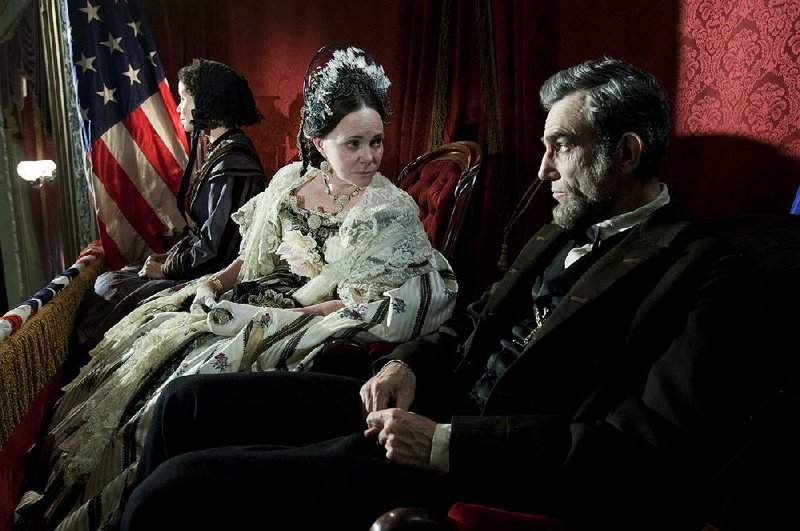LITTLE ROCK — Tonight in Hollywood they will hand out statues and a lot of the world will watch.
It’s easy to understand why. The Academy Awards are a confluence of glamour and putative history, an event that takes very seriously what was once the world’s dominant mode of mass entertainment as well as the chief means of exporting American pop culture, the Hollywood movie. Lots of people who don’t often go to the theaters care about who wins what Oscar; people who have no intention of seeing most of the featured films tune in to gawk at the clothes and to watch the stars and old gray white men tear up. (Red carpet coverage begins at 6 p.m. on ABC.)
I will watch too, at least most of it.
The Oscars are compelling in the same way I might find a late July game between the Atlanta Braves and New York Mets compelling. I follow the game well enough to know the story lines and am interested in the outcome, though what is happening on the TV screen is not important to me. I don’t dismiss the investment of those who root for their favorites and understand how watching the game play out can be a lot of fun.
And I’ve written enough about the hypocritical, self-serving aspects of the Oscars over the years, No one needs to be reminded that the Academy Awards are a self congratulatory promotional stunt or that a popular vote is no way to identify quality art. The Oscars are about honoring a certain kind of self-serious, middlebrow entertainment product. Movies are commercial ventures and even the most serious and dreary ones cost money to produce. So let’s not talk too much about the ways they might index the zeitgeist or tell us secrets about ourselves. They are mostly circuses and spectacles and Anne Hathaway is yowling through tears.
But I do like most of this year’s contenders for Best Picture; if Amour or Beasts of the Southern Wild were to win, I might agree that the “best” has been identified. Both movies work on a level that cannot be explicated by language; there is something indirect and perhaps sacred in the way they affect the receptive viewer. They work the way poetry works, obliquely and elliptically, toward a kind of truth that can’t be apprehended head on. Amour reminds us we are mortal, that we are vain and wasting and that which we most cherish will one day be ripped from us by forces we cannot understand.
And Beasts reminds us that magic yet abides in our world, that amid the cruelty, disappointment and even apocalypse there is an opportunity for delight.
SMART MONEY
Because I believe there is such a thing as smart money, I hold out no chance for either film. It is enough for them to be nominated, I guess, and their financial prospects have been improved by the exposure. Amour director Michael Haneke is the severe Austrian playwright turned filmmaker whose entire oeuvre is a reaction against the prevailing Hollywood cinematic style of overt obviousness. He cannot expect to be handed a little golden man by a member of the Chamber of Commerce for setting his camera down in the rooms of a dying old woman (Emmanuelle Riva, who they say has a chance at the Best Actress trophy). Hollywood does not reward those who mock it or scorn it.
No true foreign language film has won the Best Picture Oscar. Counting Amour, only nine foreign language films have been nominated for the award. Only three that have more than a smattering of subtitled dialogue - The Godfather Part II in 1974, The Last Emperor in 1987 and Slumdog Millionaire in 2008 - have won Best Picture.
Nor can 30-year-old Benh Zeitlin expect his Beasts to win, for he is still callow and given to making dreamy statements with nonprofessional actors and - as one reviewer had it - superimposing a neoconservative fantasy over George W. Bush’s response to Hurricane Katrina. In other words, Beasts is too strange and outre to be taken seriously by those members of the Academy who have to work for a living. (And those assimilating aurochs! What did they stand for?)
Then there’s Django Unchained, the latest Quentin Tarantino assemblage, a chop shop special that mashes up and grinds out tropes.Tarantino is a special case, a movie brat savant who obviously lavishes great feeling on his work, yet persists in the stunted perception of a bright 12-year-old boy. It is possible to make a case for his movies - his type of movies. He imports whole parts of other movies we’ve maybe glimpsed or maybe only heard about into his remarkably well-curated fever dreams. More than anyone else, Tarantino understands how cinema short-circuits the brain. He works those automatic responses, probes our limbic systems with his light and noise. But in the end, he understands too well that it’s only light and noise, only a movie, and undercuts his own best instincts. He has to go on too long and, like his godfather (or favorite unacknowledged uncle) Steven Spielberg, he has to go a step too far to explain himself to an audience he does not quite trust to understand him.
And why should they trust us? A friend of mine, a sophisticated moviegoer, confessed that he was disappointed that Spielberg’s Lincoln - perhaps the co-favorite for the Best Picture award - did not (spoiler alert) actually show John Wilkes Booth’s attack on the president. “If I’m going to watch a bio-pic about Lincoln,” he told me in bewildered seriousness, “I want to see Lincoln get shot.”
I don’t attribute my friend’s feeling of incompleteness to any ghoulish tendency, only to Spielberg’s failure to genuflect at what has become one of our historical stations of the cross. That Lincoln gets shot is one of the things we know about our history. Movies teach us what to expect from them and they have taught us to expect to be reassured and flattered. They have taught us that even if we do not understand at the beginning, if we sit patiently for a few minutes, all will be made clear; every joint will sooner or later dovetail into another until the thing is trued and square. After years of movies ingraining their conventions, we require them to conform.
LINCOLN OR ARGO?
Lincoln is a tremendous accomplishment, the result of dozens if not hundreds of experts collaborating and matching fabric swatches. People pored over photographs and musty records to make this movie; Daniel Day-Lewis transported himself back in time to observe and absorb the soft Kentucky hitch in the 16th president’s cadence. There is much about it I like; despite the historical hiccoughs in Tony Kushner’s screenplay, the movie rings “true.”
Yet, like Tarantino’s revisionist Django, Spielberg’s definitive Lincoln leaves me just a little cool, like I’ve watched a clinic on how to build a perfect historical drama. They are impressive movies, but lack the messiness of any genuinely transcendent human enterprise. Tarantino and Spielberg are master craftsmen and Tarantino understands the uses of shock therapy, but I have trouble fully believing in either of them. They make dependable movies and serve their fans, but I fear that I can see a little too clearly around the sides of their operation.
Similarly, Ang Lee’s Life of Pi is a stunning visual exercise married to a problematic script, which begins with a problematic novel that hundreds of thousands of people adore. If you are about visual sensation, this is a tremendous movie. If you care about storytelling, you might perceive the movie as a cheat. In any case, it’s not something I expect I will think about very much over the course of the next few months, much less years. In this way, it fits in with a lot of previous Best Picture winners - Crash, Shakespeare in Love and Chicago - in that it’s a well-made, but ultimately negligible movie.
I might say the same about David O. Russell’s Silver Linings Playbook. It’s the sort of standard Hollywood serious comedy (like American Beauty, a Best Picture winner I’ll defend) that sometimes wins these things. Yet there is so much in the movie’s opening half-hour or so that rings false - Bradley Cooper’s hurling Hemingway out a window, his whole incessantly manic take on crazy - that put me off. Not even Jennifer Lawrence’s welcome arrival could draw me back into the film.It reminds me a little of The Fighter, Russell’s workmanlike, yet much beloved 2010 movie in that it feels like an attempt to elevate ordinary material with superb performances. I don’t dislike the movie but it’s possibly the weakest of Russell’s career, and I can’t understand how it ended up on so many end of-the-year Top 10 lists.
But I do get Les Miserables; I just don’t like the stage musical it converts into spectacle. I’ve never found the lyrics or the music particularly moving. Though I appreciate what director Tom Hooper was trying to do by pushing his camera into the faces of his actors to make them insistently frank and unironic, the melodies aren’t strong enough to hold my interest. And the Javert character was risible even before Russell Crowe began to croak his lines. While there are those who will disagree, I’m not convinced there’s much point in converting big form Broadway musicals to the screen. The only advantage is that cinema makes the experience transportable, allowing the production into small town theaters and private homes. But I think you’d do better with a soundtrack album and the well of your imagination than with anyone’s camera shoving into any movie star’s flash-blanched smile.
I also get Argo - which the latest indices have placed as perhaps the favorite to win this year’s Best Picture Oscar. I like Argo and I like how Ben Affleck has matured from a louche movie star into a filmmaker of superb authorial control. I even understand his decision to cast himself in the lead. Aside from the inevitable historical inaccuracies, it’s the only nit I can pick. It’s not that Affleck is bad, it’s just that he’s distracting and too much a movie star to play a gray ghost like Tony Mendez. Argo is one of three Best Picture nominees that lean on actual events and, while its third act is fanciful, it evokes its period as well as any recent movie. Set in 1980, it feels like a midsize Warner Bros. production from the era. It is enjoyable and satisfying on several levels. But if it wins, it raises the question of how can the director of the Best Picture not be considered the year’s Best Director?
The same conundrum arises in the case of Zero Dark Thirty, for its director, Kathryn Bigelow, was also “snubbed” by voters who denied her a Best Director nomination. Still, like Argo, Zero Dark Thirty is one of those thrillers that sustains suspense even though we know how it ends. And while I have heard people criticize it on cinematic grounds, almost all the backlash against it seems like knee-jerk political cant.Zero Dark Thirty isn’t a documentary, but it has a journalistic component. It seems dogmatic to criticize it on the grounds that it portrays torture as one of the techniques employed in the hunt for Osama bin Laden; American operatives were complicit in those techniques and Bigelow’s movie can’t honestly be read as an endorsement of them. Besides, the political argument obscures the movie’s remarkable force and pacing, the shallow arc of the shadowy main character (played with sobering steel by Jessica Chastain) and the filmmakers’ willingness to drop their audience, in situ, into a complex and important story about our dangerous world. It takes an act of faith to make a movie that treats audiences like grown-ups, one that’s unlikely to be rewarded by Hollywood.
In the end, I expect Argo or Lincoln to win, not because they are the best movies and not because they are dumbed-down crowd pleasers, but because they best embody what Hollywood is good at - making us believe that we are up to all challenges, indefatigable, unconquerable and, most of all, American.
Style, Pages 49 on 02/24/2013



